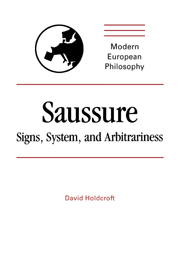Book contents
- Frontmatter
- Contents
- Preface
- Introduction
- 1 Saussure's work: its context and significance
- 2 The distinction between langue and parole
- 3 Language as a system of signs, I: Signs, arbitrariness, linearity, and change
- 4 Language as a system of signs, II: Diachronic and synchronic linguistics
- 5 Language as a system of signs, III: Identities, system, and relations
- 6 Language as a system of signs, IV: Values, differences, and reality
- 7 Successes and failures
- Notes
- Bibliography
- Index
1 - Saussure's work: its context and significance
Published online by Cambridge University Press: 11 January 2010
- Frontmatter
- Contents
- Preface
- Introduction
- 1 Saussure's work: its context and significance
- 2 The distinction between langue and parole
- 3 Language as a system of signs, I: Signs, arbitrariness, linearity, and change
- 4 Language as a system of signs, II: Diachronic and synchronic linguistics
- 5 Language as a system of signs, III: Identities, system, and relations
- 6 Language as a system of signs, IV: Values, differences, and reality
- 7 Successes and failures
- Notes
- Bibliography
- Index
Summary
That the work of Saussure, a Swiss linguist, should be the subject of a book in a series called Modern European Thought should occasion little surprise, for his subject was one to which he made a seminal contribution. What is notable is that he is an important figure not only in the development of twentieth-century linguistics, but also in that of European philosophy and the human sciences. What then distinguishes Saussure from other linguists of his generation whose work had no such impact?
Perhaps the pre-eminent difference is his concern for foundational issues, unclarity about which had been, he thought, the source of much confusion in the practice of comparative and historical linguists – the dominant nineteenth-century tradition – so much so that further progress depended on their clarification. Connected, he believed that the new conception of language that he proposed was important not simply because it cleared up confusions which had hindered the progress of linguistics itself, but also because it avoided mistakes which it was all too easy to make in the philosophy of language. So he believed that his work had important implications not only for linguistics but for philosophy too.
At first his philosophical morals had very little impact outside linguistics itself. But, as Mounin says, Saussure's work, however belatedly, affected ‘and unquestionably enriched the thought of such thinkers as Merleau-Ponty, Lévi-Strauss, Henri Lefebvre, Roland Barthes, Lacan, Michel Foucault, and through them all the contemporary social sciences’ (1968, 9).
- Type
- Chapter
- Information
- SaussureSigns, System and Arbitrariness, pp. 4 - 18Publisher: Cambridge University PressPrint publication year: 1991

